TOBRAMYCIN - INJECTION
PHONETIC PRONUNCIATION: (TOE-bra-MYE-sin)
COMMON BRAND NAME(S): Nebcin
GENERIC NAME(S): tobramycin sulfate
Uses
USES: This medication is used to prevent or treat a wide variety of bacterial infections. Tobramycin belongs to a class of drugs known as aminoglycoside antibiotics. It works by stopping the growth of bacteria.
How to use TOBRAMYCIN - INJECTION
HOW TO USE: This medication is given by injection into a vein or muscle as directed by your doctor, usually every 8 hours. The dosage is based on your medical condition, weight, and response to treatment. Laboratory tests (such as kidney function, levels of drug in the blood) may be performed to help find the best dose for your condition. If you are giving this medication to yourself at home, learn all preparation and usage instructions from your health care professional. Before using, check this product visually for particles or discoloration. If either is present, do not use the liquid. Learn how to store and discard medical supplies safely. For the best effect, use this antibiotic at evenly spaced times. To help you remember, use this medication at the same time(s) every day. Continue to use this medication until the full prescribed amount is finished, even if symptoms disappear after a few days. Stopping the medication too early may allow bacteria to continue to grow, which may result in a return of the infection. Tell your doctor if your condition persists or worsens.
Side Effects
Precautions
Interactions
Overdose
Images
Reviews
Faq for TOBRAMYCIN - INJECTION
Tobramycin injection is an antibiotic medication used to treat various bacterial infections, including those affecting the respiratory system, skin and soft tissues, urinary tract, and other organs.
Tobramycin injection is typically given directly into a vein (intravenous infusion) or injected into a muscle (intramuscular injection) by a healthcare professional. The exact dosage and duration of treatment depend on the specific infection being treated.
Common side effects of Tobramycin injection include stomach upset, nausea, vomiting, diarrhea, headache, dizziness, rash, and itching. Notify your doctor if any side effects become severe or persistent.
Tobramycin injection should only be used during pregnancy or breastfeeding if the potential benefits outweigh the risks. It is recommended to consult with a healthcare professional before using this medication in such cases.
Some precautions to consider while using Tobramycin injection include informing your doctor about any allergies or kidney problems, notifying them of any other medications or supplements you are taking, avoiding use in children below 1 year old, and following the prescribed dosage and schedule.
Tobramycin injection may interact with other medications, such as diuretics, lithium, muscle relaxants, and certain anesthetics. It is important to inform your doctor about all medications you are currently taking to avoid any potential drug interactions.
The onset of action of Tobramycin injection varies depending on the type and severity of the infection. Improvement in symptoms may occur within a few days, but it is important to complete the full course of treatment prescribed by your healthcare provider.
Yes, Tobramycin injection can cause allergic reactions in some individuals. Signs of an allergic reaction include swelling, rash, itching, difficulty breathing, and dizziness. Seek immediate medical attention if you experience any of these symptoms after using Tobramycin injection.
If you miss a dose of Tobramycin injection, consult your healthcare provider for instructions. It is important not to double the dose to make up for the missed one.
Warning
WARNING: This medication can cause serious kidney problems and nerve damage, resulting in permanent hearing loss (including deafness or decreased hearing) and balance problems. The risk is increased if you are older, already have kidney disease, or if you have a severe loss of body water (dehydration). Your risk is also increased if you receive high doses, or with longer use of this medication. Tell your doctor right away if you notice ringing/roaring sounds in the ears, hearing loss, dizziness, or an unusual decrease in the amount of your urine. Careful monitoring by your doctor will reduce the risk of these side effects. Monitoring may include hearing, kidney, urine, and drug blood level tests. Avoid other medications that may increase your risk for these serious side effects if taken together with tobramycin. See also Drug Interactions section.
Disclaimer
IMPORTANT: HOW TO USE THIS INFORMATION: This is a summary and does NOT have all possible information about this product. This information does not assure that this product is safe, effective, or appropriate for you. This information is not individual medical advice and does not substitute for the advice of your health care professional. Always ask your health care professional for complete information about this product and your specific health needs.

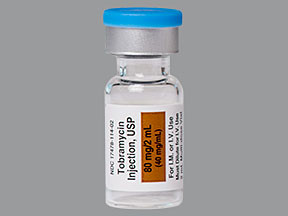
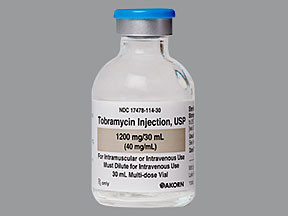
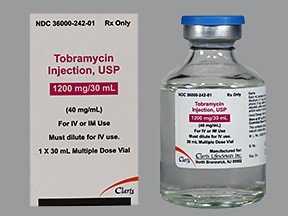
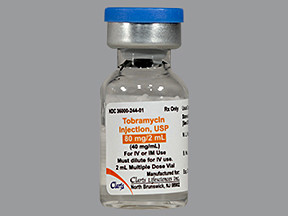
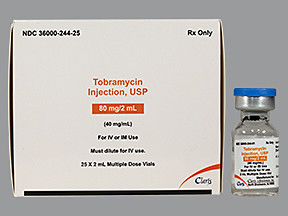
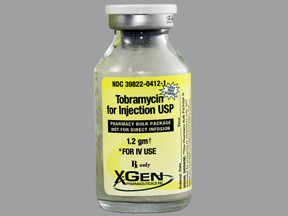
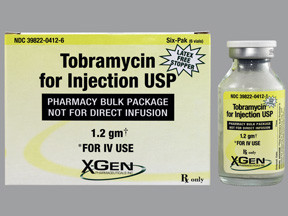
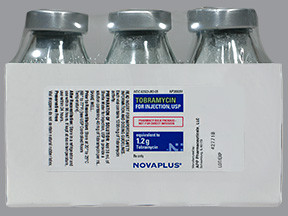
No Reviews Yet